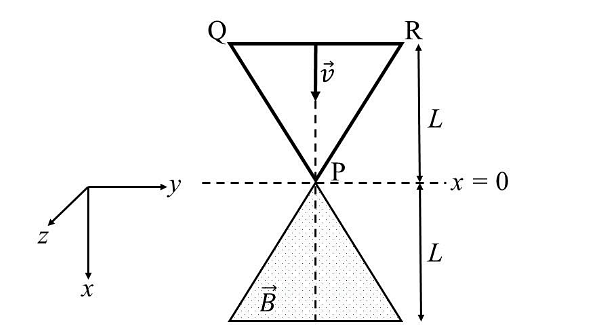Question:
Both the roots of the equation $(x-b)(x-c)+(x-a)(x-c)+(x-a)(x-b)=0$ are always
Both the roots of the equation $(x-b)(x-c)+(x-a)(x-c)+(x-a)(x-b)=0$ are always
Updated On: Jun 14, 2022
- positive
- negative
- real
- None of these
Hide Solution
Verified By Collegedunia
The Correct Option is C
Solution and Explanation
$(x-b)(x-c)+(x-a)(x-c)+(x-a)(x-b)=0$
$\Rightarrow 3x^2-2(a+b+c)x+(ab+bc+ca)=0$
Now, discriminant $=4(a+b+c)^2-12(ab+bc+ca)$
$=4\big(a^2+b^2+c^2-ab-bc-ca\big)$
$=2\Big\{(a-b)^2+(b-c)^2+(c-a)^2\Big\}$
which is always positive.
Hence, both roots are real.
$\Rightarrow 3x^2-2(a+b+c)x+(ab+bc+ca)=0$
Now, discriminant $=4(a+b+c)^2-12(ab+bc+ca)$
$=4\big(a^2+b^2+c^2-ab-bc-ca\big)$
$=2\Big\{(a-b)^2+(b-c)^2+(c-a)^2\Big\}$
which is always positive.
Hence, both roots are real.
Was this answer helpful?
0
0
Top Questions on Complex Numbers and Quadratic Equations
- The minimum value of \(| z+ \frac{3+4i}{2}|, |z| \leq 1\) is,
- JEE Main - 2024
- Mathematics
- Complex Numbers and Quadratic Equations
- For $z \in C$ if the minimum value of $(| z -3 \sqrt{2}|+| z - p \sqrt{2} i |)$ is $5 \sqrt{2}$, then a value of $p$ is ______
- JEE Main - 2023
- Mathematics
- Complex Numbers and Quadratic Equations
- The remainder when $(11)^{1011}+(1011)^{11}$ is divided by $9$ is
- JEE Main - 2023
- Mathematics
- Complex Numbers and Quadratic Equations
- Let $p , q \in R$ and $(1-\sqrt{3})^{200}=2^{199}(p+i q), t=\sqrt{-1}$ Then $p + q + q ^2$ and $p - q + q ^2$ are roots of the equation
- JEE Main - 2023
- Mathematics
- Complex Numbers and Quadratic Equations
- If the shortest between the lines $\frac{x+\sqrt{6}}{2}=\frac{y-\sqrt{6}}{3}=\frac{z-\sqrt{6}}{4}$ and $\frac{x-\lambda}{3}=\frac{y-2 \sqrt{6}}{4}=\frac{z+2 \sqrt{6}}{5}$ is $6$ , then the square of sum of all possible values of $\lambda$ is
- JEE Main - 2023
- Mathematics
- Complex Numbers and Quadratic Equations
View More Questions
Questions Asked in JEE Advanced exam
- A region in the form of an equilateral triangle (in x-y plane) of height L has a uniform magnetic field 𝐵⃗ pointing in the +z-direction. A conducting loop PQR, in the form of an equilateral triangle of the same height 𝐿, is placed in the x-y plane with its vertex P at x = 0 in the orientation shown in the figure. At 𝑡 = 0, the loop starts entering the region of the magnetic field with a uniform velocity 𝑣 along the +x-direction. The plane of the loop and its orientation remain unchanged throughout its motion.

Which of the following graph best depicts the variation of the induced emf (E) in the loop as a function of the distance (𝑥) starting from 𝑥 = 0? - Two beads, each with charge q and mass m, are on a horizontal, frictionless, non-conducting, circular hoop of radius R. One of the beads is glued to the hoop at some point, while the other one performs small oscillations about its equilibrium position along the hoop. The square of the angular frequency of the small oscillations is given by [ \(\epsilon_0 \)is the permittivity of free space.]
- JEE Advanced - 2024
- Moving charges and magnetism
- A group of 9 students, s1, s2,…., s9, is to be divided to form three teams X, Y and Z of sizes 2, 3, and 4, respectively. Suppose that s1 cannot be selected for the team X and s2 cannot be selected for the team Y. Then the number of ways to form such teams, is _______.
- JEE Advanced - 2024
- Combinations
- Let \(\vec{p}=2\hat{i}+\hat{j}+3\hat{k}\) and \(\vec{q}=\hat{i}-\hat{j}+\hat{k}\). If for some real numbers α, β and γ we have
\(15\hat{i}+10\hat{j}+6\hat{k}=α(2\vec{p}+\vec{q})+β(\vec{p}-2\vec{q})+γ(\vec{p}\times\vec{q})\),
then the value of γ is ________.- JEE Advanced - 2024
- Vector Algebra
- Let X be a random variable, and let P(X = x) denote the probability that X takes the value x. Suppose that the points (x, P(X = x)), x = 0,1,2,3,4, lie on a fixed straight line in the xy -plane, and P(X = x) = 0 for all x ∈ R - {0,1,2,3,4}. If the mean of X is \(\frac{5}{2}\) , and the variance of X is α, then the value of 24α is ______.
- JEE Advanced - 2024
- Probability
View More Questions
Concepts Used:
Complex Numbers and Quadratic Equations
Complex Number: Any number that is formed as a+ib is called a complex number. For example: 9+3i,7+8i are complex numbers. Here i = -1. With this we can say that i² = 1. So, for every equation which does not have a real solution we can use i = -1.
Quadratic equation: A polynomial that has two roots or is of the degree 2 is called a quadratic equation. The general form of a quadratic equation is y=ax²+bx+c. Here a≠0, b and c are the real numbers.




